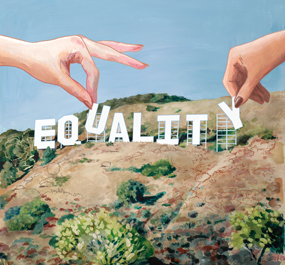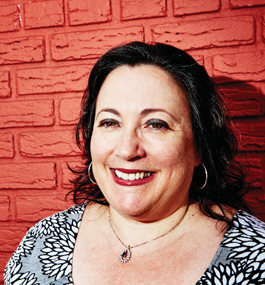Hollywood’s Chief Agitation Officer
Activist blogger Melissa Silverstein ’89 is playing a leading role in changing the rampantly sexist entertainment industry.

Alyssa Carvara
by Heather Salerno
Right before “Justice League” premiered in November, the highly anticipated superhero flick got some unexpected attention — thanks to Melissa Silverstein ’89. She retweeted a photo of the skimpy torso-baring costumes worn by Amazon warriors in Zack Snyder’s film next to one of the armor-like protective gear sported by the Amazons in “Wonder Woman,” directed by Patty Jenkins.
“Here is a fantastic example of the difference between the male and female gaze,” wrote Silverstein. Her tweet — liked by more than 42,000 Twitter users — sparked an online controversy that generated global headlines and caught the attention of stars like Jessica Chastain. “Hey men, what would you wear to fight? Hint: Don’t expose your vital organs,” wrote Chastain in a retweet of Silverstein’s comment.
If Silverstein had posted that same tweet a year earlier, she doubts it would have gotten the same reaction. But with the explosion of the #MeToo and the #TimesUp movements, she says there’s more awareness about the struggles women have in the entertainment industry and elsewhere.
“People were able to keep their heads in the sand for a really long time because there was no clarion call for a shift in the culture,” she says. “But now people understand what’s going on. You can’t avoid it any longer.”
Silverstein has been fighting for women in film and TV for more than a decade, speaking out about unfair treatment as the founder of the influential website Women and Hollywood. What started as a blog in 2007 has evolved into, as she describes it, “an initiative that educates, advocates and agitates” for gender equality and inclusion in Hollywood and the global film industry. Meanwhile, Silverstein is gaining prominence as a respected activist, featured everywhere from The New York Times and The Washington Post to CNN and the BBC.
‘A small but mighty shop’
With help from a small group of dedicated part-time freelancers, Women and Hollywood publishes stories each day that reach thousands of readers. Silverstein’s site features interviews with women filmmakers, champions female-driven projects and doesn’t hesitate to call out those who aren’t doing their part. “We are a small but mighty shop,” Silverstein says.
For instance, although series like “Jessica Jones” and “Queen Sugar” are making female directors a priority, Silverstein notes that the hit CBS sitcom “Mom” has used only three women directors during its five-year run. “What the f—? It’s a show about women!” she says. “There’s a lot of rectifying that needs to go on.”
In addition to her duties online, Silverstein attends film festivals, moderates panels, hosts networking events, and promotes work that is in line with the values of Women and Hollywood and that she’s excited about. Last fall, Women and Hollywood was hired by the distributor of Greta Gerwig’s “Lady Bird” to spread the word about the coming-of-age drama through screenings and social media.
Silverstein is also co-founder and artistic director of the Athena Film Festival at Barnard College, which launched in 2011 to highlight women’s leadership on-screen and in real life. This year’s festival in New York City showcased 46 films, drew more than 6,000 attendees, and welcomed high-profile guests that included Gloria Steinem, Lena Dunham and J.J. Abrams.
Silverstein has never been a producer or a screenwriter. She doesn’t want to be a director (although she jokes she’d “be a great one”). So why did she become such a fiery advocate for women in an industry she isn’t involved with? It’s about equality. “If women are missing from the conversation and our stories are not centered in the narrative, then the message is we don’t matter,” she says.
Women and Hollywood recently received donations in honor of its 10th anniversary from such patrons as director Ava DuVernay, producer Regina K. Scully and Amazon Studios. It’s funded largely by the Dobkin Family Foundation, a philanthropic organization that supports women’s issues and programs that promote social change.
Despite the site’s title, Silverstein doesn’t even live in Hollywood. The Long Island native runs her operation out of the Brooklyn home she shares with her shepherd dog, Duke. Over an omelet at a small restaurant in her neighborhood, Silverstein explains that, after graduating from Brandeis with a degree in American studies and earning a master’s from Columbia in theater management, she worked for groups like the Ms. Foundation for Women and the White House Project, a now-defunct nonprofit devoted to increasing the number of women in government and business.
Later on, as a freelance consultant, she helped with marketing campaigns for female-driven films, including “The Hours” and “Bend It Like Beckham.” She couldn’t help but notice that movies with women, and particularly with women directors, were few and far between — and few people were talking about why. “There was really no conversation about this at all,” she says.

Amy Lombard
Melissa Silverstein ’89
page 2 of 2
Outsider with insight
A few years later, when the blogosphere was beginning to take off, Silverstein decided to jump in with her thoughts on the topic. At first, her blog was “terrible,” she laughs. “For a while, I had that imposter syndrome, like ‘What could you possibly know about Hollywood if you don’t live in Hollywood?’”
But she kept plugging away, and insiders took notice. “I learned to trust my voice,” she says. “I started writing blog posts about things like ‘Where are all the women directors?’ and ‘Where are all the interesting female characters?’”
Ten years later, Silverstein is still asking the same questions, though more people are listening. There has been some progress: 2017 was notable, with female-fronted films (“Star Wars: The Last Jedi,” “Beauty and the Beast” and “Wonder Woman”) becoming the three highest-grossing movies of the year and first-time director Gerwig and cinematographer Rachel Morrison (“Mudbound”) scoring Academy Award nominations in categories where women are rarely honored.
“I cried a lot that day,” Silverstein says of the Oscar nominations announcement. “It was very emotional.” Yet it’s clear the industry still needs to do better when it comes to female storytelling and hiring women — especially those of color — in front of and behind the camera. “The numbers haven’t changed much,” she says. “It takes a long time for people to deal with their unconscious bias and systemic sexism.”
Indeed, according to San Diego State University’s Center for the Study of Women in Television and Film, the number of female protagonists in 2017’s top 100 films dipped to 24 percent, down 5 percent from the previous year. Women accounted for only 18 percent of all directors, writers, producers, executive producers, editors and cinematographers working on last year’s top 250 domestic grossing films — a figure that’s virtually unchanged since 1998.
Calling out hypocrisy in entertainment
Silverstein says there’s still an urgent need to address other key issues, such as equal pay for equal work, creating policies where women can report harassment safely and without retaliation, and establishing industry-wide programs that support caregivers. “This is what I’m passionate about,” she says. “I’m a pit bull. I just don’t give up.”
Silverstein’s outsider status gives her the ability to be fearless, too, when critiquing influential figures. When Cannes Film Festival director Thierry Frémaux and president Pierre Lescure issued a statement that denounced producer Harvey Weinstein, who is accused of sexual misconduct against more than 100 women, Silverstein tweeted her disgust. She pointed out that not only does Cannes have a poor track record when it comes to female representation in the competition, the festival has long turned a blind eye to the sex trade that goes on there every year.
“Frémaux and Lescure would be smart to examine their own culpability in the misogynist culture that allowed Weinstein to abuse women for decades,” she wrote. “I am done with people who are complicit casting stones in glass houses by speaking out against Weinstein. It’s time they look at themselves.”
British filmmaker Amma Asante says Silverstein is among those whose activism has paved the way for more-open conversations about the disrespect and exclusion that women in entertainment often face. “She never lets anything slip under her radar,” says Asante, who first met Silverstein when she invited the filmmaker to show her breakthrough movie, “Belle,” at the 2014 Athena Film Festival. “She is the watchwoman of the industry, who always has the courage to speak up and shout.”
Most recently, Silverstein planned a three-day TV and screenwriting lab as part of the Athena Film Festival that took place in Los Angeles in June. Participants partnered with established filmmakers and met industry executives. It’s a strategy she hopes will provide more creative women with the tools they need to succeed. She expects to take on more consulting jobs to help get more female-led projects noticed. She’s also crafting a business plan to expand Women and Hollywood into a media company.
Why does Silverstein work so hard to influence a field that’s just about, well, entertainment?
“It’s so much more,” she says. “Movies and TV are our cave paintings. They’re what we leave behind. So if women and people of color are missing, then that means their stories didn’t matter enough to our culture, and there are no other narratives besides white male narratives. That’s unacceptable.”
Heather Salerno is a freelance writer who lives in the Greater New York City area.
